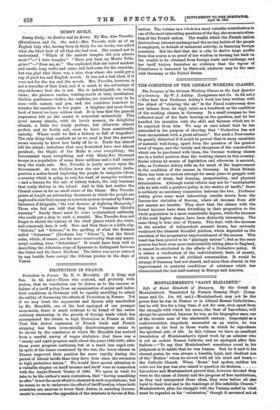Bunny : its Rustics and its Ruins. By Mrs, Alec
Tweedie. (Hutchinson and Co. 18s. net.)—Mrs. Tweedie tells us of an English lady who, having been in Sicily for six weeks, was asked what she liked best of all that she had seen. She seemed not to understand. "Which of the ancient temples did you admire most ?"—" I hate temples." "Have you been up Monte Pelle- grino ?"—" Dear me, no." She explained that she hated markets and smells, long walks and ruins, and had come for the sunshine, but was glad that there was a nice shop where she could get a cup of good tea and English novels. It was not a bad ideal, if it were not for the tea and tho novels. Mrs. Tweedie, however, is not a traveller of that kind, and it is much to the advantage of stay-at-homes that she is not. She is indefatigable in seeing ruins ; she pictures rustics, waiting-maids at inns, carabiniers, Sicilian gentlemen—ladies, she explains, are scarcely ever to be seen—with camera and pen, and she contrives somehow to transfer the sunshine to her pages. A brighter and more lively book of travel we have seldom read. It is true that the general impression left on the reader is somewhat melancholy. This jewel among islands, with its lovely scenery, its delightful climate, a little too windy perhaps, but otherwise almost perfect, and its fertile soil, seem to have been consistently unlucky. Where could we find a history so full of tragedies ? The only thing that comforts us as we read is that tho peasant seems scarcely to know how badly off he is. Trade has almost left the island ; industries that once flourished have now almost perished ; the blight of the Mafia is over everything; the Government taxes everything, and with thirty-five thousand troops in a population of some three millions and a half cannot keep the roads safe. Mrs. Tweedio is justly severe upon the Government. At one Sicilian town she saw in sinister juxta- position a notice-board imploring the people to emigrate—from a country which is going to ruin for want of energetic workers ! —and a bureau for the sale of lottery tickets, the only business that really thrives in the island. And in this last matter the Church comes in for no small share of the blame. Mrs. Tweedio prints at length an astounding document in which the people are implored to risk their money on a certain system invented by Father Salvatore d'Atripalda, "the real Saviour of Suffering Humanity." Those who fail are told that they have "forsaken Christ's warning." Surely there must bo some ecclesiastical authority who could put a stop to such a scandal. Mrs. Tweedio does not forget to sketch the history of the chief places which she visits, and commonly does it well. Now and then there is a little slip. " Soloeis," not " Soleous," is the spelling of what the Romans called " Solantum" (Diodorus has " Solous "), but the Greek coins, which, of course, aro far more trustworthy than any manu- script reading, have " Solontinus." It would have been well in describing the Athenian siege of Syracuse to distinguish between the Outer and the Inner Harbour. The latter was never entered by any hostile force except the Cilician pirates in the days of Verres.


















































 Previous page
Previous page